Picking Up Speed: The Potential Performance Effect Of Music On Swimmers

When Xonzy Gaddis, Swimming World College Intern, wrote about the potential impact of music on athletic performance in 2018, he was picking up on a theme well understood in certain quarters of the elite swimming world. Go back decades and you find archive records of coaches using music in the mix of their training sets and sessions.
Here below is what Xonzy highlighted, followed by a case example from the archive in which Craig Lord, our Editor-in-Chief, looks at the Olympic Nice program of coach Fabrice Pellerin and how his programs for charges Yannick Agnel and Camille Muffat included the use of music as a performance tool on the way to three titles among six medals between them at the London 2012 Olympic Games.
Who can say a swim practice without music isn’t fun? Music has become the hype factor during several swimming competitions, greatly affecting swimmers during warmups and finals. The relationship between the swimmer and the headset during several Olympic Games continues to grow stronger.
Why does music have such a powerful effect on the athlete? What good does it do them?
Mixing it Up
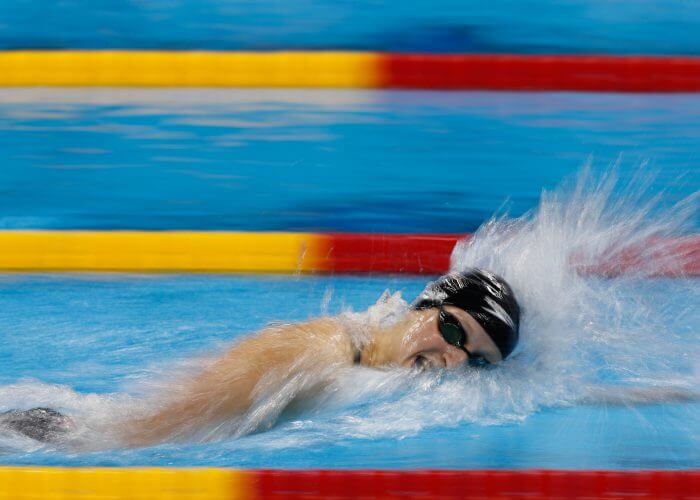
Katie Ledecky – Photo Courtesy: Fernando Frazão/Agência Brasil
In 2006, Peter Terry and Costas Karageorghis conducted a study on psychophysical effects of music in sport exercise, demonstrating the positive effects of music on the human brain. For example, if athletes work out with music in the background, they are more likely to keep up their exertion level for much longer than training without it.
According to Terry and Karageorghis, differing beats create a rhythmic response in the mind: faster beats generate a more stimulative effect, while slower beats create a sedative effect.
Swimmers are typically looking to get that adrenaline rush going. A music suggestion to keep that hype is a Black-Eyed Peas classic, “I Gotta Feeling”.
Get that feeling to sprint all the way through your next 200!
Effects of Moving with the Music!
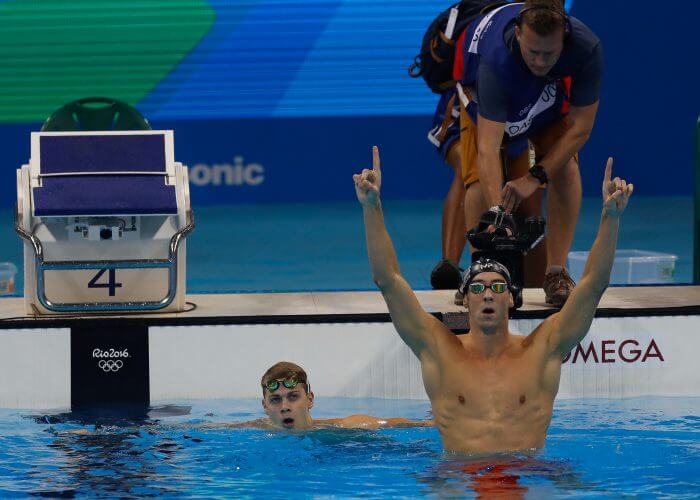
Michael Phelps – Photo Courtesy: Fernando Frazão/Agência Brasil
Have you been moving with the music? As long as you’re moving quickly, no worries! Karageorghis and David-Lee Priest from Brunel University demonstrate that a close relationship exists between how an athlete synchronizes their movements to the music they listen to in their study on music in sport and exercise.
A swimmer looks to create an efficient and rhythmic turnover, moving through the water more smoothly and with more speed.
The Billboard 100’s top rhythmic song to keep your tempo steady would be Travis $cott’s “Sicko Mode.” Make sure you keep that steady tempo up for your next gruelling mile!
The Rhythm Of The Beat!
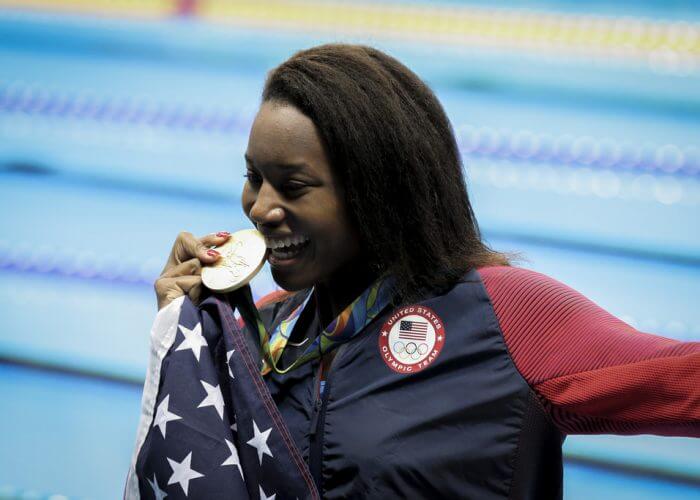
Simone Manuel – Photo Courtesy: Flcikr
Should your music be going as fast you’re moving? Karageorghis’ study, showcased on the PBS News Hour, demonstrated that if an athlete’s music beat is around 120 to 140 beats per minutes (about the same number of beats as their heart rate), there is a chance of improved stamina and overall athletic performance. Anything over 140 beats per minute would not likely yield performance benefits. Ultimately, for an elite swimmer with an average heart rate of around 33 to 50 heartbeats per minute, even a 120 beat-per-minute is quite high.
Chill Vibes
The crazy beats are not always for everyone. Swimmers jamming out to chill beats do exist! Does the music make them slower in the water than pumped up beats? No! In fact, according to a study conducted by Dave Elliott, music – whether it has a more relaxing tempo or more upbeat – creates the same effect for an athlete. Under what Elliott calls “competitive sport anxiety,” relaxing tempos, upbeat tempos, or even no music at all does not create a difference in the way one completes their motor tasks. You can find Elliott’s full article here: The effect of relaxing music for anxiety control on competitive sport anxiety.
Relaxing music also has been shown to help athletes recover more easily. Researchers J. Ling and W. Xudong, claim that music therapy can promote improved kidney function and has a positive impact on cardiovascular, muscular, and psychological fatigue. This music therapy creates a better emotional, spiritual and physiological environment for swimmers after a race.
But swimmers such as Michael Phelps and Simone Manuel still walk out on deck with their headsets blasting and hyping them up for their next medals.
An Extract From The Craig Lord Archive
Pellerin’s Crew Tunes In To Water Music – 2011
French coach Fabrice Pellerin has kitted out his squad, including Yannick Agnel and Camille Muffat, with waterproof mp3 players loaded with the sounds of Hans Zimmer’s Dark Knight (Batman), Vivaldi’s Four Seasons, Love the Way You Lie with Eminem and Rihanna, the Beatles and Mozart.
“There is no theme that better echoes sport than music,” said Pellerin
“If I did not see any link between the two, I would not do it. The quick or slow movements of a symphony can correspond to a race construction with management, accelerations. I want to introduce them [the swimmers] to the musical states of mind that will allow them to maintain a rhythm or to change it if the race demands.”
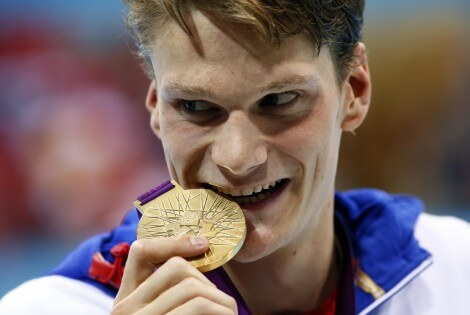
Yannick Agnel – Photo Courtesy: Rob Schumacher-USA TODAY Sports
On a tour of the US, a nation that gave us Bob Bowman’s Phelpsian Symphony from a boyhood visit to a pool where watching Tracy Caulkins translated to the sound of a soaring movement for the coach to be, Pellerin talked to L’Equipe reporter Pascal Glo through a quarter of an hour of Agnel’s training.
The European 400m free champion works to the pace of the Dark Knight.
“The piece climbs progressively in volume and a rhythm sets in, repetitive. The two arms ahead working in tune to the uniform beating [kicking] of his legs. Three chords of cello violoncello [the cello] appear then disappear by the time he has taken three arm strokes.”
On Muffat, he told the paper: “Camille now swims better than before when I simply said ‘do one 25m faster’. She is more streamlined because she is following the music and knew that one note follows another. Beyond that, she is more relaxed.”
Agnel, his mp3 loaded with his own wide-ranging choices – Beatles, Black Desire, Mozart, Polnareff, Superimposers, Nine Inch Nales and Breakbo – sounded not unlike Mumble (Happy Feet) when he said: “I’m not very good at finding the rhythm of my swimming – but I think this will help me.”
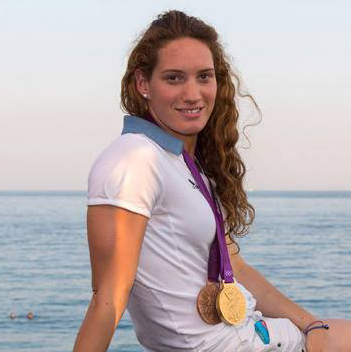
Camille Muffat
Pellerin says he has seen children with a musical education take to swimming more quickly than others. Music now features in three out of 12 sessions for his group. He intends to try some Heavy Metal at some stage: Vivaldi played by the likes of French guitarist Patrick Rondat or Ulrich Roth of the Scorpions.
All in tune with his plans to have his pupils make a big noise in London next July.
Fast-forward and we find Agnel with 200m freestyle gold, 4x100m freestyle gold and 4x200m freestyle silver round his neck and Camille Muffat with 400m freestyle gold, 200m freestyle silver and 4x200m freestyle gold round her neck at the London 2012 Olympic Games.
A Note Of Sorrow
- Tragically, Camille Muffat was killed on 9 March 2015, as a part of a group of sports stars participating in the French reality TV show Dropped. She was killed along with nine other people when two helicopters collided in mid-air during filming in northwestern Argentina. Her funeral was held in a private ceremony in the Church of St. John the Baptist, in Nice, on 25 March, in a joint service with boxer Alexis Vastine, who died in the same accident.
All commentaries are the opinion of the author and do not necessarily reflect the views of Swimming World Magazine nor its staff.




Maria Espinoza Lissa Bartley Parker
Madeline Nelson
Daryl Wells
jams
Liam Crook Tom LiuZoe Ellen
Dale Sprosty we need to get underwater speakers!! ?
Angie Carter any idea how much those cost?
Christina Springer Fiant I will have to look into it! They love that CSG has them.
Andelys Warren Paul Schindler music at training is good!
Emilie Ditte Meng
Melissa Malkan Healy…. let’s hook it up!!
Tay Thomas
Sarah Campbell this is similar to your survey right??
Yeah!!
Brian Goodell – “Radar Love” by Golden Earing
It really help you to pump up i have experienced it most of the times especially in dryland training.
Sheila Mulcair , will you be introducing this!!! no WHAM please ?
Grainne Kelly the best of wham is essential on car journey to and from galas.
.